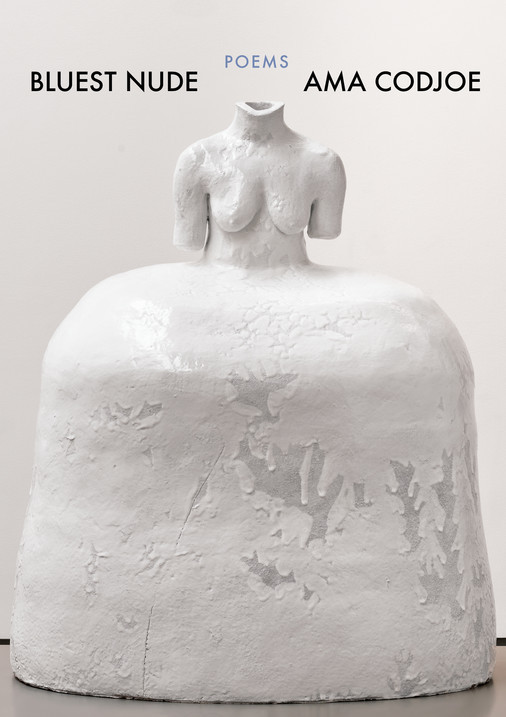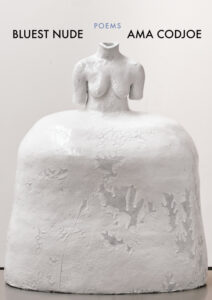Ama Codjoe is the author of Bluest Nude (Milkweed Editions, 2022) and Blood of the Air (Northwestern University Press, 2020), winner of the Drinking Gourd Chapbook Poetry Prize. Her recent poems have appeared in The Nation, The Atlantic, The Best American Poetry series, and elsewhere. Among other honors, she has received a Rona Jaffe Foundation Writer’s Award, a Creative Writing Fellowship from the National Endowment for the Arts, a NYSCA/NYFA Artist Fellowship, and a Jerome Hill Artist Fellowship. She lives in New York City.
Table of Contents:
- Of Being in Motion
- On Seeing and Being Seen
- Bluest Nude
Of Being in Motion
There’s a body marching toward mine.
I can feel its breasts and stomach, hot
against my back. Its breath in my hair.
I accumulate bodies—my own.
The tattoo braceleting my wrist.
My earlobe like a pin hole camera.
My vagina, untouched. My vagina,
stretched. So many bodies treading
toward the others. And the bruises I conceal
with makeup and denial. The scars I inflict
on myself, and the ones I contort
with a mirror to see. I didn’t always know
we’d be joined like this—that I couldn’t
leave any of myself behind.
In Trisha Brown’s Spanish Dance
a performer raises both arms like a bailora
and shifts her weight from hip to hip, knee
to knee, ankle to ankle, until she softly
collides with another dancer. The two travel
forward, pelvis to sacrum, stylized fingers
flared overhead, until they meet a third woman
and touch her back like stacked spoons.
Dressed in identical white pants and long
sleeves, the dancers repeat the steps
until, single file, five women shuffle
forward—they go no further.
The dance lasts the exact length of Bob Dylan’s
rendition “Early Mornin’ Rain.”
How many versions of myself pile
into the others, arms lifted in surrender,
torsos twisting to the harmonica?
But the dancers—I’m moved by their strange
conga line. A train of women traversing
the stage, running gently into a wall.
On Seeing and Being Seen
I don’t like being photographed. When we kissed
at a wedding, the night grew long and luminous.
You unhooked my bra. A photograph
passes for proof, Sontag says, that a given thing
has happened. Or you leaned back to watch
as I eased the straps from my shoulders.
Hooks and eyes. Right now, my breasts
are too tender to be touched. Their breasts
were horrifying, Elizabeth Bishop writes. Tell her
someone wanted to touch them. I am touching
the photograph of my last seduction. It is as slick
as a magazine page, as dark as a street
darkened by rain. When I want to remember
something beautiful, instead of taking
a photograph, I close my eyes.
I watched as you covered my nipple
with your mouth. Desire made you
beautiful. I closed my eyes.
Tonight, I am alone in my tenderness.
There is nothing in my hand except a certain
grasping. In my mind’s eye, I am
stroking your hair with damp fingertips. This is exactly
how it happened. On the lit-up hotel bed,
I remember thinking, My body is a lens
I can look through with my mind.
Bluest Nude
1.
When my mother was pregnant, she drove
every night to the Gulf of Mexico.
Leaving her keys and a towel on the shore,
she waded into the surf. Floating
naked, on her back, turquoise waves
hemming her ears, she allowed
the water to do the carrying. It isn’t
true. My mother lived hours inland
and her doctor prescribed bed rest. I want her
to be weightless, belly up and moon-lit
or filling a bathtub with hot water and stepping
gingerly, so as not to slip, easing herself
into the cramped tub, rimmed
with dirt from her husband and son,
soaking for as many minutes as she could,
savoring the water as it turned cold.
2.
In the news, there was another
incident . . . If I describe how
the officer treated
the young woman’s body,
I am also describing
the color of her body.
Let me refuse simile.
I do not wish to write it.
3.
In the flower of my body—
blossoms belonging,
at last,
to me,
sovereign
place, where I am no one
but myself: peony and cracked vase,
weeping beech and spiraled shell,
siren, matron, Jezebel—
a rush of bees enters me,
and I am not stung;
petals unfold in night’s
bluest hymn.
4.
The blue swimming pool. The blue
in a record’s groove, revolving.
The pink hydrangea turned
powder blue. Glory-of-the-snow
blue. Blue-black blue. The blue
of a bruise. Wild blueberry
blue. The blue you pick. The blue
you choose. The blue that bucks us
like a bull. The blue bowl full
of lilacs. The blue that falls
as tufts of hair from the barber’s
chair. The blue sun makes.
The blue shade of a yellow pine.
Television blue. Cadmium blue.
Blue twisted into the spools
of your DNA, forking into two
directions. Blue darkening
your knees. The blue you miss
because—though it almost
killed you—blue was,
for a season, your home.
5.
There was another . . . incident.
If I describe how the officer treated
the young woman’s body, I am also
describing the color
of my body.
6.
Then the last piece, a solemn veil lifted
and tossed to the floor. I know the history
of my body is a pair of hacked off hands
playing the piano. Day after day in the artist’s
studio, I smell the melon’s ripe decay.
I draw a second body, then a third, and so on.
My bodies reveal nothing and conceal
nothing. Pin-up beauty, runaway, Venus
of the Circus Act, nightwalker, wet nurse,
odalisque, reclining nude. The women are me
and are not only me. Ours are the only eyes.
We construct our seeing as clay or wood
into figurines of air. We perceive their shapes
and uses just as wind is seen by watching leaves.
These are the paintings I make of myself.
Art is drawn on the cave of my body.
There are as many walls inside me
as there are bones at the bottom of the sea.
It matters little how small I am in the pool
of another’s eye. It’s awe or indifference
I crave. I want to be seen clearly or not at all.
The moon is an eye flung open, useless
without a pupil. It soothes me, this not seeing.
Painters have gone blind staring at the sun.
At the center of a hurricane is an eye,
in the midst of which one believes
the storm is over. A woman’s face can break,
fall as quickly as night. Sometimes, when I cry,
all of the eyes which are mine—painted, sketched,
photographed—begin to shed blue tears. I catch them
in my hands or with pots and pans. Or let them fall
as drifts of snow. I eat them by the fistful.
When you look at me, in our most intimate
exchanges, you drape my nakedness
in a fabric I neither sewed nor bought. You pin
my beauty with a tack against the wall, or me against
a four-poster bed: thighs splayed, nipples spilling
spoiled milk. In every light, the fact of history
strips me blue. These are the conditions. The point is
to go on. Drawing myself, as water from a well,
I can no longer believe in an innocence
that was never mine. It is impossible to draw
a self-portrait without the other women figured
onto my flesh like barnacles fixed to a gray whale.
I am rough to touch. I am the yellow song
of a blue pain. The women and I walk
a tightrope of night. Our eyes adjust to growing
darkness. We make of our vision: knowingness.
It’s love the women and I make. Love fashions
our sight. We drink from the Waters That Were
Once Snow. We are quenched and we are thirsty.




